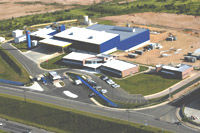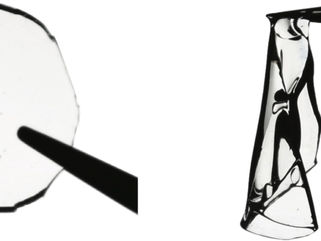BASF Paves the Way for a Smoother Ride Across Millions of Miles
Chattanooga plant supplies asphalt polymers that help make roads better
Advertisement
The latest travel industry projections show that Americans taking a summer trip by car will reach record numbers this year as vacationers stay closer to home. They can expect a smoother ride if the pavement they are traveling on contains a special elastomer made by BASF.
BASF supplies the world with these elastomers, or asphalt-modifying polymers, from its plant in Chattanooga, Tennessee. The product, known as Butonal(R) latex polymer, helps to prevent potholes, cracking and rutting in roads, and general deterioration of road surfaces.
"BASF has been selling the Butonal polymers for more than 30 years, primarily in North America, with our global business developing during the last five to eight years," said John Berry, Global Business Manager. "Today, we literally supply the world with asphalt modifying polymers produced in Chattanooga and shipped to customers in the United Kingdom, Europe, China, the Middle East and South Africa, as well as customers in North and South America."
The asphalt modifiers produced at the Chattanooga plant on Amnicola Highway are used for both hot mix applications for road construction and repair and for cold mix applications used for protective road surface coating applications.
"These BASF polymers create a strong elastomeric network which binds the asphalt particles and aggregates together," explained Chattanooga Site Manager J.D. Purvis. "When added to the asphalt, our Butonal polymers strengthen the asphalt and make the road surface stronger and more resistant to adverse weather conditions."
"For example," Purvis continued, "BASF polymers can be used to maximize road durability in different climates. Severe cold temperatures like those found in the Rocky Mountains can make the asphalt brittle and cause it to crack. Asphalts modified with our polymers reduce cracking despite heavy snowfall and frigid temperatures."
"Our polymers also perform well at high temperatures in states such as Florida, Nevada and Texas. On a hot summer day when temperatures top 100 degrees Fahrenheit, the road surface may become soft, making it easier for heavy traffic to damage the road. Asphalt modified with Butonal polymers can realize substantially reduced rutting even in desert climates. Preventing damage to the roads such as cracking and rutting ultimately makes the roads safer for motorists to drive on," he said.
Butonal polymers can be added to asphalt used for busy freeways, city streets and scenic country roads. They can be used to construct new roads or repair existing surfaces.
"The concept of pavement preservation, or preventing good roads from deteriorating, is becoming more and more essential," Berry explained. "Extensive road repairs are expensive and time consuming. BASF is a strong supporter of pavement preservation. Our Butonal polymers are well suited for this program. Simple repairs and surface treatments undertaken at an early stage prevent major road damage, are safer and reduce cost. This not only saves taxpayers money, it means less time waiting during road construction and a smoother more comfortable ride."
In addition to asphalt modifiers, BASF's Chattanooga plant also produces polymer dispersions for a variety of applications, including binders for the manufacture of vinyl flooring as well as adhesives for vinyl and ceramic flooring installation, polymer for foam pillows and mattresses, sealants for beverage cans, soft flexible backing for washable rugs and binders for gaskets.



































































